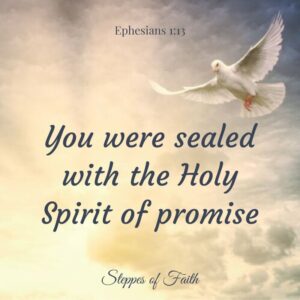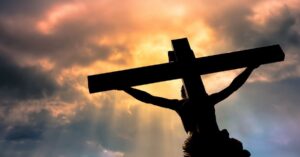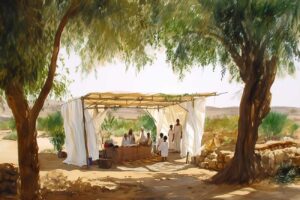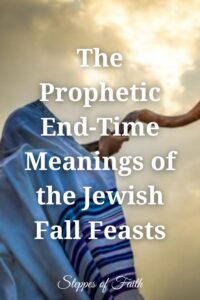
“You were sealed with the Holy Spirit of promise.” (Ephesians 1:13)
Like the Jewish Spring feasts (Passover and Pentecost), the Fall feasts—Rosh Hashanah, Yom Kippur, and Sukkot—also hold special prophetic meaning for followers of Jesus.
The Fall feasts occur in the Jewish month of Tishri (late September/early October). The first feast is Rosh Hashanah, the Jewish New Year. It is a joyful time spent with friends and family, eating sweet foods, blowing the shofar (ram’s horn), fasting, performing charitable works, and attending worship services. It is also a call to repentance when the Jewish people settle in for prayer, seeking God’s mercy so He will write their names in His Book of Life. If God does not write their name in the Book of Life, the belief is God will write their name in the Book of Death.
However, God will not write many people’s names in either book. Those people have another ten days to repent and seek God’s mercy. These ten days are called the “Days of Awe” or “Ten Days of Repentance” and end on Yom Kippur when God closes the books.
While it may seem that Rosh Hashanah and Yom Kippur have purely Jewish significance, prophecy records that they both point to New Testament end-time events.
The Day of Trumpets
Rosh Hashanah is known as the Day of Trumpets and, alternately, the Day of Judgment. On this day, the Jewish people blow a trumpet called the shofar up to one hundred times throughout the day. The shofar is a symbolic call to repentance, for people to mourn their sins and rededicate their faith.
The holiday holds a different meaning for Christians, who can view it in anticipation of Jesus’ return based on the prophet Joel.
“Blow the trumpet in Zion and sound an alarm in My holy mountain! Let all the inhabitants of the land tremble, for the Day of the LORD is coming, for it is at hand: a day of darkness and gloominess; a day of clouds and thick darkness like the morning clouds spread over the mountains.” (Joel 2:1-2)
Jesus also prophesies the coming Day of Judgment/Trumpets, plus the coming rapture of the saints.
“And He will send His angels with a great sound of a trumpet, and they will gather together His elect from the four winds, from one end of heaven to the other.” (Matthew 24:31)
Paul repeats Jesus’ prophecy.
“We shall not all sleep, but we shall all be changed—in a moment, in the twinkling of an eye, at the last trumpet. For the trumpet will sound, and the dead will be raised incorruptible, and we shall be changed.” (1 Corinthians 15:51-52)
“For the Lord Himself will descend from heaven with a shout, with the voice of an archangel, and with the trumpet of God. And the dead in Christ will rise first. Then we who are alive and remain shall be caught up together with them in the clouds to meet the Lord in the air.” (1 Thessalonians 4:16-17)
Revelation 11 confirms both prophecies, when an angel will sound the seventh and last trumpet from heaven.
“Then the seventh angel sounded [his trumpet], and there were loud voices in heaven saying, ‘The kingdoms of this world have become the kingdoms of our Lord and of His Christ, and He shall reign forever and ever!’” (Revelation 11:15, with addition)
At the last trumpet, God will rapture all believers, dead and alive, and soon after, Jesus will return. At that time, He will defeat His enemy, Satan, and establish His eternal messianic kingdom.
Yom Kippur, the Jewish Day of Atonement
At the end of the “Days of Awe,” the Jewish people celebrate Yom Kippur, the Day of Atonement. It is the holiest day of the Jewish year, even for non-practicing Jews. For 25 hours, the people attend worship services, fast and pray in penitence, and perform charitable deeds. They also abstain from bathing, applying makeup, lotion, and perfume, wearing leather shoes, and having marital relations. The men typically wear white to symbolize purity from sin and remind themselves of their mortality.
Orthodox Jews also perform a “Kapparot” ceremony, where they symbolically place their sins onto a rooster or chicken (the “scapegoat,” Lev 16) and kill it as a blood sacrifice. They then take the dead animal to a butcher for carving and give its meat to the poor.
The Bible clearly indicates that a blood sacrifice must be made for the atonement of sins.
“For the life of the flesh is in the blood, and I have given it to you upon the altar to make atonement for your souls.” (Lev 17:11)
The writer of Hebrews reiterates the need for such a sacrifice.
“Without the shedding of blood, there is no remission [of sins].” (Heb 9:22, with addition)
For believers, Yom Kippur is a reminder that Jesus came to be the ultimate blood sacrifice for all people. When He died on the cross, He made atonement for our sins. Under the old covenant’s sacrificial system, shed blood merely covered one’s sins. But under the new covenant of Jesus, His shed blood through a “once for all” (Heb 9:27) sacrifice washes our sins away completely.
“Christ was offered once to bear the sins of many.” (Heb 9:28)
“For by one offering, He has perfected forever those who are being sanctified.” (Heb 10:14)
Jesus is the true sacrificial Lamb of God. He alone made atonement for sin, making animal sacrifices to God unnecessary. Further, His “once for all” atonement renders an annual Yom Kippur (Day of Atonement) unnecessary.
Those who put their trust in Jesus know there is only one “day of atonement”—the day Jesus died on the cross.

The Book of Life: Jewish vs. Christian
The point of Rosh Hashanah and Yom Kippur is for one to gain the assurance that God will write their name in the Book of Life. God makes His verdict on Rosh Hashanah, but He does not seal it until ten days later on Yom Kippur. Therefore, the Jewish people wish each other “a good final sealing” (g’mar chatimah tovah) every year.
Until Yom Kippur, God does not seal the people’s eternal destiny in the Book of Life, so they must perform particular works to obtain it. They must make amends to those they have wronged, pray, confess, and do good deeds to live another year. If they do not, God may decide to take their life in the coming year. Their fate is in their hands, and they have no assurance.
Thankfully, Jesus changed all that because of His atoning work on the cross.
Because of Jesus, believers have full assurance that their names are instantly written in His book when they accept His gift of grace. His love solidly seals our eternal destiny.
“In Him you also trusted, after you heard the word of truth, the gospel of your salvation; in whom also, having believed, you were sealed with the Holy Spirit of promise.” (Eph 1:13)
“And do not grieve the Holy Spirit of God, by whom you were sealed for the day of redemption.” (Eph 4:30)
“Now He who establishes us with you in Christ and has anointed us is God, who also has sealed us and given us the Spirit in our hearts as a guarantee.” (2 Cor 1:21-22)
At the moment of salvation, our names appear in His book (Phil 4:3; Rev 3:5, 13:8, 17:8, 20:12, 15, 21:27, 22:19). And even if God ends our life, we have the added assurance that we will be in heaven with Him (2 Cor 5:8).
But it does not end there. God will still check the Book of Life to see if our name is in it.
The Day of Judgment
One day, we will still stand before God on the Day of Judgment, also called the “Great White Throne Judgment.”
“Then I saw a great white throne, and Him who sat on it, from whose face the earth and the heaven fled away. And I saw the dead, small and great, standing before God, and books were opened. Another book was opened, which is the Book of Life. And the dead were judged according to their works by the things which were written in the books. Then Death and Hades were cast into the lake of fire. This is the second death. And anyone not found written in the Book of Life was cast into the lake of fire.” (Rev 20:11-12, 14-15)
Of course, God knows every name in His book, so He does not need to check it. However, He will still judge our thoughts (Lk 8:17; Rom 2:16), words (Mt 12:37), and actions (Mt 16:27) against His holy standard. We will all fall short because of our sinful nature, but we are encouraged. God does not condemn us because of His Son Jesus’ sacrifice (Rom 8:1). Therefore, He spares us from the lake of fire.
Instead, God will judge us akin to a pie contest at the county fair. Some people’s pies will be better than others, but no one is declared a loser. Everyone wins a blue ribbon of eternity with Him.

Promises for Believers
Four days after Yom Kippur, the Jewish people celebrate the third Fall feast, Sukkot, the Feast of Tabernacles. It has two meanings for them.
First, it is a day commanded by God to celebrate His miraculous rescue of the Israelites from Pharaoh (Leviticus 23:34-35, 42-43) by living in a temporary shelter just as the Israelites did as they wandered in the wilderness for forty years. It is also a day to celebrate the last ingathering of the fall harvest, which is why it is sometimes called the Feast of Ingathering.
For Christians, Sukkot points to modern times in which Jews and Gentiles worship together in Jerusalem. But it also prophetically refers to a future time when Jesus will “tabernacle” again with His people in the millennial kingdom. We will also celebrate His presence and Israel’s restoration as the nations are “ingathered” to Him.
The Fall feasts of Rosh Hashanah, Yom Kippur, and Sukkot represent special moments in Israel’s past. But they also hold great promise for believers in Christ.
Because of Jesus and His sacrificial atonement on the cross, God will write our names in the Book of Life, and we will “tabernacle” with Him eternally when the angel sounds the last trumpet. We do not need to wait and wonder if we have “a good and final sealing.” His blood already seals us through the power of His gracious and merciful Holy Spirit.
READ MORE: Pastor David Jeremiah’s Revelation Prophecy Chart
